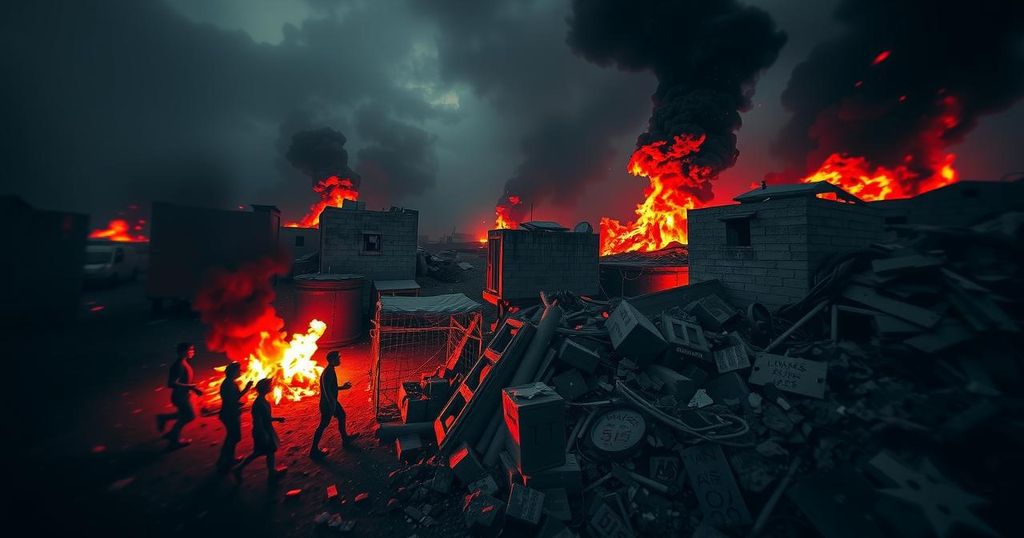Global news
- ARABY AL - JADEED, AFRICA, AIR STRIKES, ASIA, BARAK RAVID, CAIRO, CIVILIAN CASUALTIES, CONFLICT, DEVELOPMENT AID, EGYPT, FATAH, GAZA, GAZA STRIP, HAMAS, HUMANITARIAN CRISIS, ISRAEL, LEBANON, NORTH AMERICA, PALESTINIAN MINISTRY OF HEALTH, UNITED NATIONS RELIEF AND WORKS AGENCY FOR PALESTINE REFUGEES, UNITED STATES, WEST BANK
Leila Ramsay
0 Comments
Ongoing Israeli Military Aggression Results in Civilian Casualties in Gaza and Lebanon
Israeli military operations in Gaza and Lebanon have led to significant civilian casualties, with reports indicating 33 deaths and 156 injuries in the last 24 hours. Overall, the death toll since October 7 has reached 43,374. The humanitarian situation in Gaza is critical, with hospitals destroyed and aid blocked. Concurrently, discussions among Palestinian factions are ongoing while Israel escalates its military actions in Lebanon, provoking regional tensions.
The ongoing Israeli military actions continue to escalate in both Gaza and Lebanon, resulting in significant civilian casualties and widespread destruction. Reports from the Palestinian Ministry of Health indicate that over the last 24 hours, Israeli operations have led to the deaths of 33 civilians and injured 156 others in Gaza. The total casualty count since the onset of hostilities on October 7, 2023, now stands at an alarming 43,374 fatalities and 102,261 injuries. The devastation in Gaza is profound. The Gaza government media office labelled the northern region as a “disaster-stricken governorate,” where all hospitals have been rendered inoperable, and critical infrastructure such as water and sewage systems is severely damaged. Furthermore, it has been reported that humanitarian aid has been systematically blocked from entering, with approximately 3,800 aid trucks denied access, exacerbating the humanitarian crisis affecting almost 400,000 residents, including many children. In a related update, Israel has also informed the United Nations about its cancellation of the operational agreement with the United Nations Relief and Works Agency for Palestine Refugees (UNRWA) in the region, according to Israeli journalist Barak Ravid. Meanwhile, discussions between Hamas and Fatah in Cairo have concluded with an agreement to establish an administrative committee to manage Gaza’s affairs. On the Lebanese front, reports suggest that Israeli forces intercepted four drones launched from Lebanon, amid ongoing airstrikes in various Lebanese towns. The Israeli military acknowledged injuries to ten soldiers in the Gaza conflict and nine in Lebanon, with a total of 5,261 soldiers injured since the conflict began. In statements regarding the unfolding crisis, Lebanon’s caretaker Prime Minister Najib Mikati condemned Israel’s actions, calling them a reflection of the international community’s failure to respond to the aggression. He reaffirmed Lebanon’s commitment to Resolution 1701 and emphasized the need for a strong military presence in the south. Additionally, Hezbollah has claimed responsibility for an assault involving suicide drones targeting Israeli military positions in the Manara settlement, purportedly with successful strikes.
The Israeli-Palestinian conflict has a deeply entrenched history characterized by violence and political strife, particularly in regions such as Gaza and Lebanon. The recent escalation in hostilities has seen significant civilian suffering, with military actions resulting in high fatality and injury counts among civilians. The humanitarian situation has worsened, particularly with the blockade of aid to Gaza, intensifying the already dire conditions for the local population. Amidst these developments, various political dialogues, such as those between Palestinian factions, have been attempted but face challenges due to the ongoing violence and instability in the region.
In summary, the current state of affairs in Gaza and Lebanon reveals a critical humanitarian crisis exacerbated by ongoing military aggression. The extensive civilian toll and destruction of infrastructure point to a significant need for international intervention and humanitarian aid. The complex interplay between military actions and political negotiations underscores the urgency for a sustainable resolution to the conflict. The statements from Lebanese officials and the actions of groups such as Hezbollah illustrate the broader regional implications of the conflict, highlighting a precarious balance of power and ongoing hostilities.
Original Source: www.dailynewsegypt.com




Post Comment